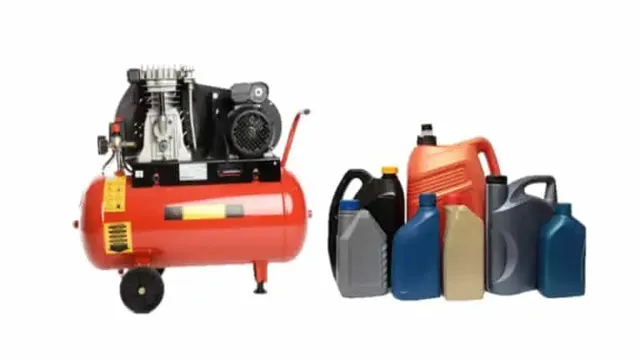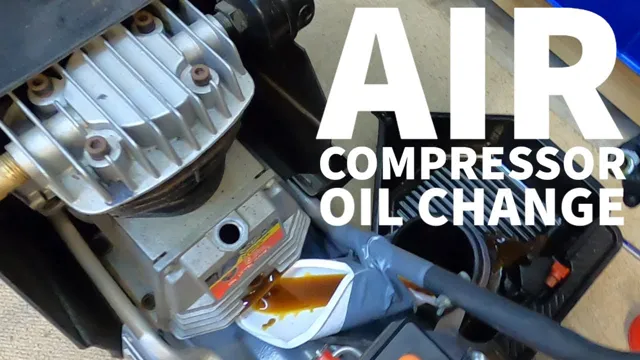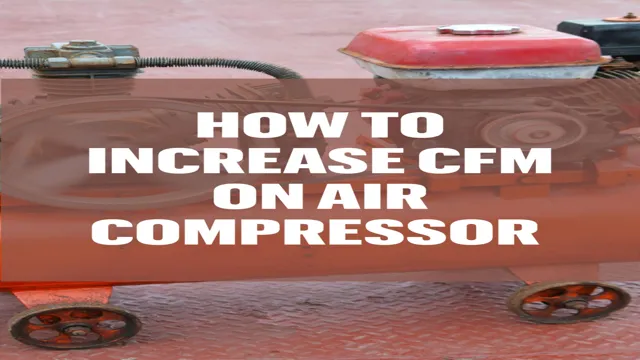
Have you ever been in a situation where you were out of compressor oil and all you had was some motor oil lying around? Maybe you’ve wondered if it’s safe to use motor oil in your air compressor. The answer is not straightforward. It depends on several factors, such as the type of air compressor you have, the grade of motor oil, and the operating conditions of the compressor.
In this comprehensive guide, we’ll dive into the nitty-gritty of using motor oil in air compressors and help you make an informed decision. Think of it as your go-to resource for all things related to compressor oil. We’ll cover the types of air compressors and their oil requirements, the differences between motor oil and compressor oil, the advantages and disadvantages of using motor oil, and the best practices for doing so.
So, buckle up and get ready to learn everything you need to know about using motor oil in your air compressor.
Introduction
If you’re wondering whether you can use motor oil in your air compressor, the answer is more complicated than a simple “yes” or “no.” While it might be tempting to use motor oil because it’s readily available and cheaper than compressor oil, it’s not recommended. Motor oil lacks some of the key properties that make it ideal for use in air compressors, including the ability to withstand high temperatures and the ability to separate water.
Using motor oil could lead to premature wear and tear on your compressor, reducing its lifespan and potentially causing serious damage. It’s best to stick with compressor oil specifically designed for air compressors to ensure your machine runs smoothly and efficiently.
What is an air compressor?
An air compressor is a crucial piece of equipment that compresses and stores air in a tank, creating a source of power to use in a variety of applications. Essentially, it works by drawing in air from the surrounding environment and compressing it to a higher pressure, creating stored energy that can be used for everything from powering pneumatic tools to inflating tires. Air compressors can be powered by electricity, gasoline, or diesel fuel, and their size and capacity can vary depending on the intended use.
Whether you’re a DIY enthusiast or a professional contractor, owning an air compressor can save you time and effort while providing a reliable source of power. So, if you’re in need of a powerful and versatile tool to have in your toolkit, consider investing in an air compressor today!

Why use motor oil?
Motor oil is an essential component in the smooth operation of your vehicle’s engine. It helps to lubricate and protect the engine’s moving parts while also helping to cool and clean the engine. Without motor oil, these parts would quickly wear out and cause significant damage to the engine.
The type of motor oil you use is also crucial, as it can affect the engine’s performance and longevity. Synthetic motor oil, for instance, is more durable and better able to withstand extreme temperatures than conventional oil. Whether you’re a casual driver or a professional mechanic, choosing the right motor oil for your vehicle is essential.
So next time you’re due for an oil change, make sure to choose a high-quality motor oil to help ensure your vehicle’s engine runs smoothly for years to come.
Using Motor Oil in Air Compressors
Many people wonder if they can use motor oil in their air compressors. While it may be tempting to use what you have on hand, it is not recommended. Motor oil is designed for use in engines, and air compressors require a different type of oil with specific additives.
Using motor oil can lead to decreased compressor performance, increased wear and tear on your equipment, and even pose a safety hazard. It is important to always use the recommended oil for your air compressor to ensure proper lubrication and functioning. While it may seem like a simple solution to use motor oil, it is not worth the risk.
Stick to the manufacturer’s recommended oil and keep your compressor running smoothly.
Types of Motor Oil
When it comes to air compressors, it’s essential to use the right type of motor oil. Generally, most manufacturers recommend using synthetic oil because it lasts longer, has better performance in extreme temperatures, and reduces wear on internal engine components. But before purchasing any synthetic oil, you must ensure that it’s the right viscosity grade for your compressor.
The viscosity grade is represented by a number, and it indicates how thick or thin the oil is at different temperatures. Using oil with the wrong viscosity grade can lead to damage to the compressor or sub-par performance. Some compressors require single-grade oil, while others require multi-grade oil that can perform in various temperatures.
It’s always better to refer to your user manual and follow the manufacturer’s guidelines to avoid voiding the warranty. Overall, using the right motor oil can help your air compressor work efficiently and reliably for years to come.
Pros of Using Motor Oil
Air compressors require motor oil to function effectively and efficiently. Motor oil features a wide range of benefits when used in air compressors. Firstly, it provides lubrication to all the moving parts within the compressor, minimizing friction and wear and tear.
This helps to prolong the lifespan of the compressor while reducing the risk of damage caused by excess heat or friction. Secondly, motor oil helps to keep the compressor’s internal parts clean by trapping any debris or dirt, preventing them from causing damage or interfering with the compressor’s performance. Using motor oil also helps to reduce the noise levels generated by the compressor, making it quieter and less intrusive in the workspace.
Additionally, motor oil offers corrosion protection, safeguarding the compressor’s internal parts from rust and other types of corrosion damage. Overall, motor oil is an essential ingredient that helps air compressors run smoothly and efficiently, making them an indispensable tool in any workshop or industrial setting.
Cons of Using Motor Oil
When it comes to using motor oil in air compressors, there are several cons to consider. While the practice is not uncommon, using motor oil in air compressors can cause a variety of issues over time. One significant issue is that motor oil is not designed for the high-temperature conditions that air compressors generate.
As a result, the oil can break down more quickly and leave deposits, reducing the unit’s efficiency and lifespan. Moreover, motor oil can contain additives that can be harmful to the environment, polluting the air and water supply. Therefore, it’s best to use compressor oil or synthetic oil specifically designed for air compressors, ensuring optimal performance and environmental safety.
Overall, by taking the time to select the right oil, you can save money and help protect the planet simultaneously.
Alternative Oil Types
If you’re wondering whether you can use motor oil in your air compressor, the answer is: it depends. While motor oil can work, it is usually not recommended as it may not be designed to withstand the high temperatures that air compressors generate. Plus, air compressors typically require a different type of oil, such as synthetic or semi-synthetic lubricants, which offer better performance and protection.
However, there are alternative oil types you can use that are specifically formulated for air compressors, such as compressor oil or pneumatic oil. These oils are designed to resist oxidation and reduce carbon and sludge buildup, helping your air compressor run more smoothly and efficiently. So, if you want to ensure the best performance and longevity for your air compressor, it’s best to stick to the right type of oil recommended by the manufacturer.
Synthetic Oil
Synthetic oil is becoming a popular alternative to traditional petroleum-based oils for many drivers. Made from chemical compounds, synthetic oil is designed to provide superior lubrication and protection for engines, particularly in extreme temperatures or high-performance applications. While synthetic oil can be more expensive than conventional oil, it can also last longer and provide better performance, making it a worthwhile investment for those who prioritize engine health and longevity.
Synthetic oil may also be more environmentally friendly, as it generates less pollution and waste during its production and use. So if you’re looking for a high-quality alternative to traditional engine oil, synthetic oil may be worth considering for your next oil change.
Mineral Oil
Mineral oil has been a popular choice as a lubricant for many years, but in recent times, people have started considering alternative oil types due to increasing health concerns associated with mineral oil. These alternative oils include plant-based oil, synthetic oil, and bio-based oil. Plant-based oils, like canola and soybean oil, are environmentally friendly and biodegradable, and they also provide good performance in a wide range of applications.
Synthetic oils are also very commonly used as an alternative to mineral oil, due to their superior lubricating properties and durability. They are also resistant to breakdown and oxidation, which makes them perfect for use in harsh conditions, such as high temperatures or heavy loads. Finally, bio-based oils are made from renewable sources, like vegetable oil, and are an environmentally friendly alternative to mineral oil.
They have excellent lubricating properties and are biodegradable, making them a great option for use in environmentally sensitive areas. By switching to any one of these alternative oil types, you can keep your equipment running smoothly while minimizing your impact on the environment.
Conclusion
In conclusion, using motor oil in your air compressor may seem like a convenient solution, but it’s important to remember that the two are not interchangeable. While both types of oil are designed for lubrication, they have different properties that make them better suited for specific applications. Using motor oil in your air compressor could lead to damage or decreased performance, which is why it’s best to stick with the manufacturer’s recommendation for oil type.
Don’t let convenience end up costing you in the long run!”
FAQs
Is motor oil safe to use in an air compressor?
Yes, motor oil can be used in an air compressor as long as it meets the manufacturer’s recommended viscosity and spec requirements.
What type of motor oil should I use in my air compressor?
It is recommended to use synthetic or non-detergent motor oil with anti-wear and corrosion-resistant properties.
How often should I change the oil in my air compressor?
It depends on how frequently you use your air compressor. It is recommended to change the oil every 3 months or after every 500 hours of use, whichever comes first.
Can I mix different types of oil in my air compressor?
No, it is not recommended to mix different types of oil as it can cause damage to the machine and affect its performance.
What will happen if I use the wrong type of oil in my air compressor?
Using the wrong type of oil can lead to poor compressor performance, increased wear and tear, and potential breakdown of the machine.
Can I use vegetable or cooking oil in my air compressor?
No, it is not recommended to use vegetable or cooking oil in an air compressor as it can lead to poor compressor performance and potential breakdown of the machine.
How do I check the oil level in my air compressor?
Refer to the manufacturer’s instruction manual for specific details on how to check the oil level. In general, you should ensure the compressor is turned off and resting on a level surface before checking the oil level with a dipstick or sight glass.







